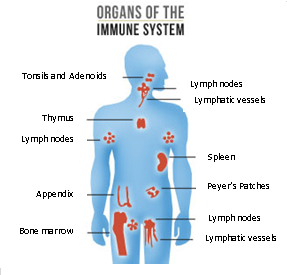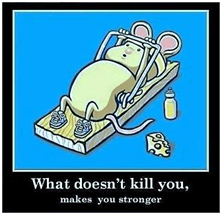|
The flu season is almost upon us. So what can we do to boost our immune system to prevent colds and flu? And if you have a cold or flu, can you exercise? These questions will be answered in this article, but first, let’s take a look at what exactly is the immune system. What is the immune system?
Thymus: The Thymus is a small organ just behind your breastbone. This is where theT-cells mature (the reason why they are called T-cells is because they mature in the Thymus) Spleen: The spleen is the largest lymphatic organ in the body. It contains white blood cells that fight infection or disease. The spleen also helps regulate the amount of blood in the body and destroys old and damaged blood cells. Bone Marrow: This is yellow tissue in the centre of the bones that is responsible for making white blood cells that will eventually form lymphocytes. Lymphocytes: These aresmall white blood cells that play a large role in defending the body against disease. There are two main types of lymphocytes: B-cells and T-cells. B-cells make antibodies that attack bacteria and toxins and T-cells help destroy infected cells. The Immune System in Action When a virus enters the body, the following processes will activate: The body recognizes a foreign antigen(virus or bacteria) and sends it to the lymph system, where it is taken up by a macrophage (cells of the immune system.The macrophage processes the virus and “writes” a code for that virus on the outside of the macrophage. The antigen signals a helper T- cell. The T-cell reads this signal and signals the other parts of your immune system. B-cell responds to the signal and reads the antigen from the outside of the macrophage.The B-cell becomes activated and produces antibodiesspecific to the antigen. These antibodies are released into your body to attach to the virus. The antibodies attach to the antigens. The antibodies send a signal to other macrophages and other immune cellsso that they can surround and destroy the antibody. Once the number of antigens has dropped and the infection has resolved,suppressor T-cells (cells that inhibit, suppress, or help to stop an immune response) will signal the other cells of the immune system to rest. Exercise and the immune system |
AuthorsDr. Marike de Klerk Categories
All
|
All rights reserved Naturopathic Health Care Centre
ADDRESS: No 13 Hazelwood Road, Hazelwood, Pretoria
TELEPHONE: 012 460 9216
PAIA Manua
Website design and digital marketing by Plan Me Pretty (PTY) Ltd
TELEPHONE: 012 460 9216
PAIA Manua
Website design and digital marketing by Plan Me Pretty (PTY) Ltd



 RSS Feed
RSS Feed